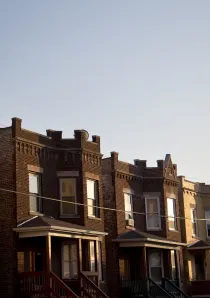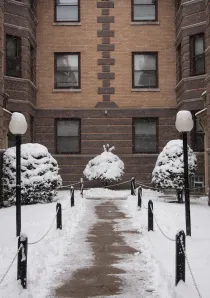Guide to Required Chicago Apartment Disclosures
Chicago law requires apartment landlords to make numerous disclosures when you sign a new lease or extend or renew a Chicago apartment lease. And Domu wants to help you comply. The following disclosures are required of Chicago apartment landlords when they ask a tenant to sign the lease agreement:
- Notice of any conditions affecting the habitability for Chicago apartments
- Identification of owner and agents
- Summary of the Chicago Residential Landlord and Tenant Ordinance (CRLTO)
- Security Deposit Interest Rate Summary
- Security Deposit Receipt
- Bed bug disclosure form
- Heating cost disclosure
- Lead-based paint disclosure
- Radon gas disclosure
- Chicago Recycling Rules flyer
We have summarized all of the various disclosures below. Some of the disclosures require some customization to describe your particular apartment, and others are ready to go. All the disclosures are discussed below.
Cook County law requires landlords to follow a tenant screening process outlined in the Just Housing Amendment to the Cook County Human Rights Ordinance. Landlords need to use a pre-qualification form to screen tenants in accordance with the Just Housing Amendment (JHA) and provide applicants with information about the JHA. Read about the JHA and how it will affect the screening process for both applicants and landlords on Cook County's website. The website includes numerous forms to help landlords comply with the JHA throughout the application process.
To keep things brief, we’ve dispensed with an analysis of the specific penalties associated with each failure to disclose. If you make the disclosure, you won't have to worry about penalties. Also, in some instances, we’ve taken the liberty of referring to the Chicago Residential Landlord and Tenant Ordinance as the “landlord-tenant ordinance” or, simply, the “RLTO.” The ordinance contains exemptions, the most common being dwelling units in owner-occupied buildings of six units or less, so landlords should consult the ordinance (in Chapter 5-12 of the Chicago Municipal Code) to determine whether they are required to comply. If not, some of the disclosures described below need not be made.
The Required Disclosures for Renting Chicago Apartments
Notice of Conditions Affecting Habitability for Chicago Apartments
The Chicago Residential Landlord and Tenant Ordinance require landlords to disclose (i) the existence of any building code violations in the past 12 months, (ii) the pendency of any “enforcement litigation” or “compliance board proceeding,” and (iii) any notice of intent by either the City of Chicago or any utility provider to terminate the water, gas, electrical, or other services, provided (in each case) that they relate to the dwelling unit being rented or the common areas of the building. In other words, if you’re in trouble with either the regulators or the utility companies, you probably need to make a disclosure. The disclosure must be made before the lease is signed. However, in the case of threatened termination of utility service, it must also be made promptly upon notice, even if the tenancy is already underway. The specific information to be delivered in the event disclosure is required, provided in Chapter 5-12-100 of the Chicago Municipal Code.
Because the landlord-tenant ordinance requires the disclosure of conditions affecting habitability, landlords exempt from the ordinance need not comply. The most common exemption extends to dwellings in owner-occupied buildings of six units or less. However, exemptions also exist for, among other things, hotels, motels, hospitals, monasteries, extended care facilities, asylums, and apartments occupied by on-site employees of the landlord.
Identification of Owner and Agents
The RLTO requires a disclosure, before the lease commences, of the name, address, and telephone number of the property owner or person authorized to manage the premises, as well as the person authorized to act on behalf of the owner for the purpose of service of process and the receipt of notices and demands. The ostensible purpose of this law is to prevent a landlord from signing a lease with a corporate or trade name and failing to supply any contact information, which would leave the tenant out in the cold if and when the roof collapses or the furnace explodes. Landlords have a continuing obligation to update their contact information (or the contact information for their agents), which also applies to successor landlords. In other words, always make sure your tenants have something in writing that allows them to find you (or even to serve you with a lawsuit if that’s what tickles their fancy). As noted above, this particular disclosure does not apply with respect to dwellings in owner-occupied buildings of six units or less, among other types of residences exempted from the landlord-tenant ordinance.
Summary of The Chicago Residential Landlord And Tenant Ordinance
Before the commencement of any written or oral lease or upon any lease renewal, Chicago apartment landlords with dwelling units governed by the landlord-tenant ordinance must provide their tenants with a summary of the ordinance. The Commissioner of the Department of Housing and Economic Development prepares such a summary, and a copy is available here. In the wake of Chicago’s notorious 2003 balcony collapse, the following language must also be included in the summary of the ordinance that’s delivered to renters: “The porch or deck of this building should be designed for a live load of up to 100 pounds per square foot and is safe only for its intended use. Protect your safety. Do not overload the porch or deck. If you have questions about porch or deck safety, call the City of Chicago non-emergency number, 3-1-1.”
Chicago Security Deposit Interest Rate Summary
Before the commencement of any written or oral Chicago apartment lease or upon any lease renewal, landlords with dwelling units governed by the ordinance are also required to provide a summary of the respective rights, obligations, and remedies of landlords and tenants concerning security deposits, including the interest rate to be paid on security deposits (as announced at the beginning of each year by the City Comptroller), as well as the interest rate in effect during the preceding two years. (The city makes a form available, and a copy can always be found here.) In recent years, landlords have gradually moved away from security deposits. They have begun assessing non-refundable move-in fees to avoid the punitive effects of the ordinance. Even if a Chicago landlord opts not to collect a security deposit, the security deposit interest summary should accompany the lease that the landlord provides to the tenant.
Chicago Security Deposit Receipt
Landlords who take security deposits (and whose dwelling units are governed by the ordinance) must also provide tenants with a security deposit receipt indicating the amount of the security deposit, the name of the person receiving it (or the identity of the landlord for whom it is received), the date on which it is received, and a description of the dwelling unit. The receipt must be signed by the person receiving the security deposit. In addition, the landlord must disclose in the lease the name of the financial institution where the security deposit is being kept. (Some landlords make this disclosure on the security deposit receipt, reference that receipt in the lease, then require the tenant to initial the reference, signifying delivery of the receipt.) Suppose, during the lease period, a security deposit is transferred from one financial institution to another. In that case, the landlord is required, within 14 days of the transfer, to notify the tenant in writing of the name and address of the new financial institution. Special rules apply to security deposits accepted by electronic funds transfer. These rules can be found, along with the remainder of the landlord-tenant ordinance, in Chapter 5-12 of the Chicago Municipal Code. A sample security deposit receipt can be found on Domu.
Chicago Bed Bug Disclosure Form
Every Chicago landlord must educate tenants about Chicago's Bed Bug Ordinance by providing a copy of the City of Chicago Department of Health's brochure about the prevention and treatment of bed bugs. Provide this brochure with every new lease and lease renewal.
Chicago Heating Cost Disclosure
The City of Chicago requires that a heating cost disclosure be made with any dwelling unit individually metered for heat. The tenant is required to pay the utility cost. The administrative regulations promulgated in connection with this law clarify that individually metered; includes central heating in multifamily apartments where the landlord pays a single utility bill and requires the tenants to pay an allocated portion computed in accordance with either sub-metering or a formula that approximates monthly usage. The purpose of the heating disclosure ordinance (which can be found in Chapter 15-6 of the Chicago Municipal Code) is to ensure that all tenants are provided with the projected average monthly cost of heating based on energy consumption during the most recent annual period of continuous occupancy by one or more prior occupants, standard utility costs, and “normal” weather.
The disclosure must be provided to the tenant prior to the consummation of any oral or written lease and prior to any exchange of money, and the landlord is required to obtain a signed receipt from the tenant verifying that the information was delivered. A new heating cost disclosure need not be made in connection with lease renewals. The city makes a preprinted form available for landlords to send directly to the utility provider, and a copy is available on Domu. Theoretically, the public utility completes the disclosure and mails it back to the landlord, who then tenders it to the prospective tenant. However, the process can often consume several weeks, and many landlords make the disclosure on their homemade form based on their own records. (In addition, many landlords call the utility company to obtain the information.)
Lead-Based Paint Disclosure Form
Any dwelling unit built before 1978 potentially contains lead-based paint, which poses health risks to adults and children alike. Federal law, therefore, requires landlords to make certain disclosures to tenants when renting out dwelling units of pre-1978 vintage. To satisfy the law, the landlord must provide the tenant with a pamphlet approved by the U.S. Environmental Protection Agency (typically entitled "Protect Your Family From Lead In Your Home") and disclose the location and condition of any known lead-based paint hazards. If the landlord possesses any reports about the existence of lead-based paint on the property, including the common areas, that information must be disclosed. Any and all disclosures must be attached to the lease, and a sample lead-based paint disclosure form is available on Domu.
Radon Gas Disclosure Form
Radon is a colorless, odorless, naturally-occurring radioactive gas that seeps out from the earth's crust, often in dangerous quantities. It’s a “Class A” carcinogen and the second leading cause of lung cancer in America. It's a clearly-identifiable health risk when your roommate unexpectedly takes up smoking. Still, when radon is seeping through the cracks in your basement foundation, you have no idea that you’re smoking several packs of cigarettes a day. Illinois is not one of the riskier terrains, although the federal and state governments encourage residents, and particularly landlords, to conduct radon testing.
The Illinois Radon Disclosure Act, 420 ILCS 46/1, requires any landlord renting out a unit on the first or second story above ground level (but not on the third story or higher) to disclose to prospective tenants the existence of a radon hazard, but only if a radon test has indicated the presence of a radon hazard. This does not require lessors to conduct radon testing. The disclosure requirement is triggered only if a prior tenant provides the landlord, in writing, with a test indicating the presence of a radon hazard or if the landlord conducts its test and determines that a radon hazard exists. Even if a radon hazard exists, landlords are not required to provide any informative pamphlet to renters. Instead, mere disclosure of the radon hazard suffices. We recommend that this disclosure be delivered in written form and obtain a receipt from the tenant. A sample radon disclosure form is available on Domu.
Chicago Recycling Rules
In 2017, the City of Chicago adopted a regulation that requires all landlords to educate tenants about recycling. (In other words, even if the CRLTO does not regulate your unit because it is an owner-occupied building of 6 units or less or meets one of the other CRLTO exceptions, the Recycling Ordinance still applies, and you must comply). With every new lease, lease extension, or renewal, Chicago landlords must educate tenants about which items are recyclable and how to prepare them for recycling before dropping them in the blue carts. Landlords must also provide property-specific information to let tenants know where to find the blue carts, the schedule for pickups, information about who to call for more information, and, for buildings of 5 units or more, the name of the private hauler that will be picking up the recyclables. Domu’s recycling form will prompt you to meet the Recycling Ordinance’s requirements. You can also find it included in Domu’s model lease.




